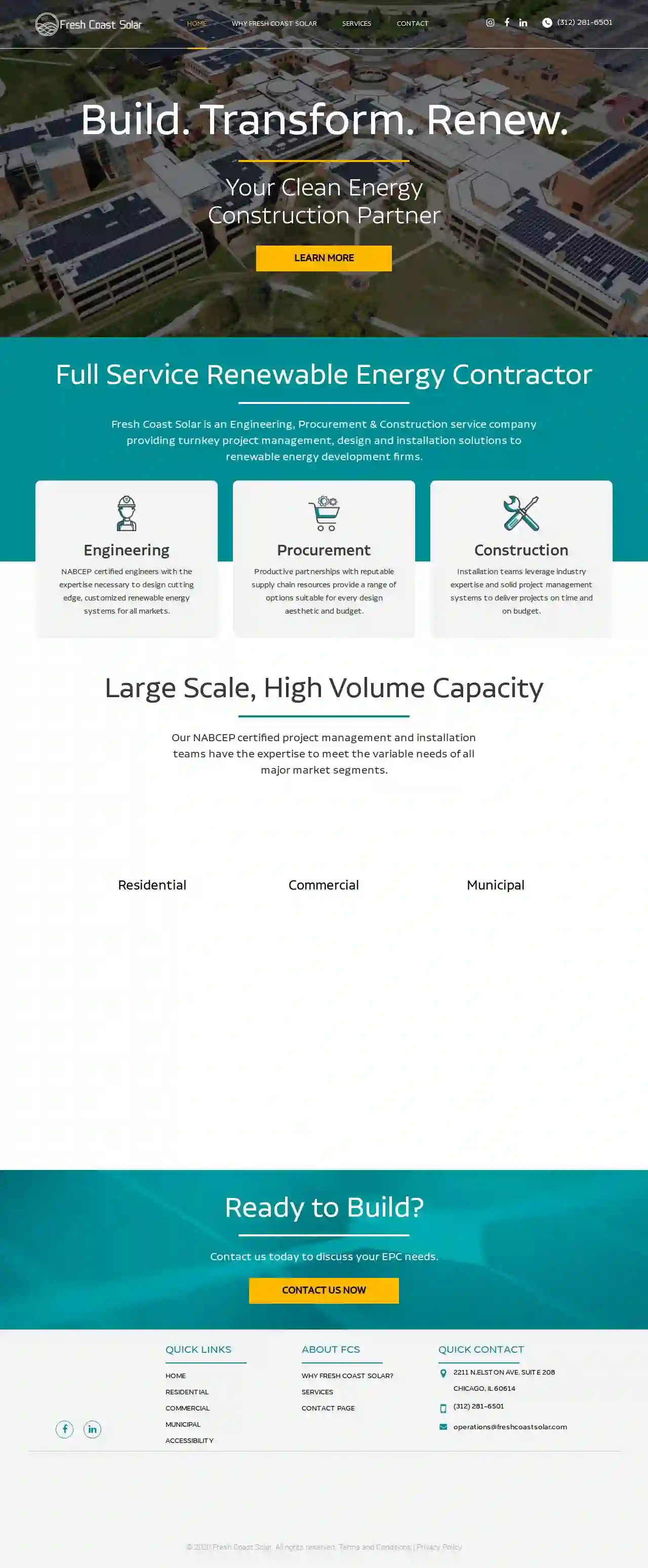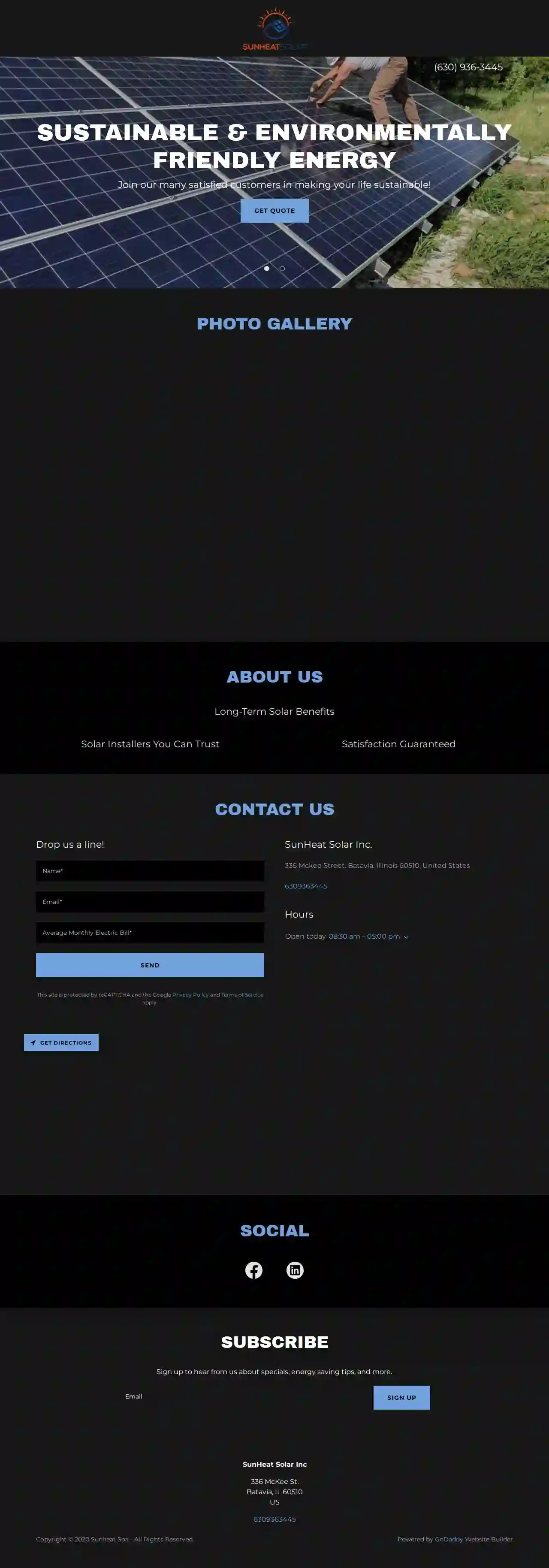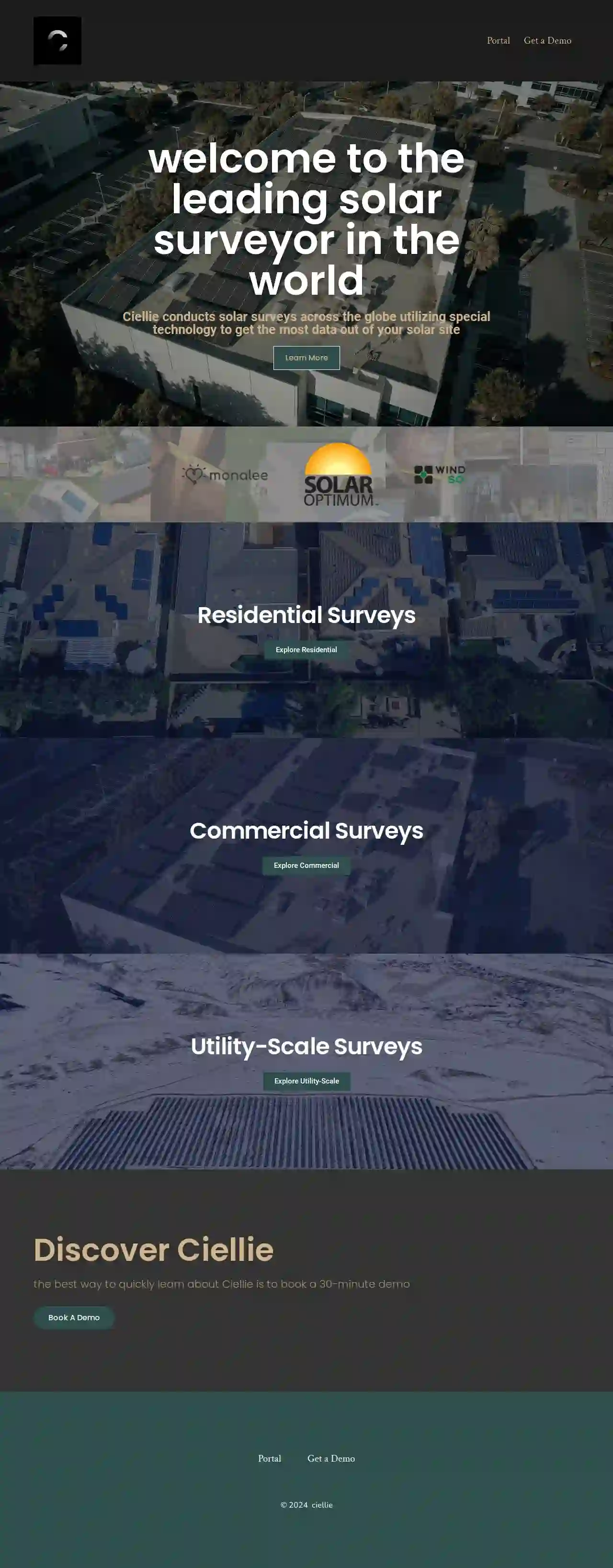Solar Installers Markham
Find Solar Installer in Markham
Receive multiple Solar Installer quotes for your project today! Compare profiles, reviews, accreditations, portfolio, etc... and choose the best service.

Route 66 Solar
4.976 reviews123 Solar Way, Suite 100, Springfield, 62704, USRoute 66 Solar is a local, family-owned solar installation company dedicated to providing high-quality solar installation services for homes and businesses. They offer a range of benefits including energy independence, carbon footprint reductions, tax savings, and property value increases. With extensive knowledge of federal/local solar incentives, they help customers qualify for a range of incentives including the Investment Tax Credit (ITC), Illinois solar rebates, and net metering. They provide 24/7 monitoring to ensure the PV installation delivers all the benefits.
- Services
- Why Us?
- Accreditations
- Our Team
- Testimonials
- Gallery
Get Quote
Radiant Solar
52 reviews2012 Tin Cup Rd Unit B, PO Box 343, Mahomet, 61853, USRadiant Solar is a solar company in Champaign County serving Central Illinois. A Veteran owned and family operated business , we aim to provide affordable, quality, green energy solar panel installations to our customers by cutting out the middle-man. Not only saving you money now, but for years into the future.
- Services
- Why Us?
- Accreditations
- Gallery
Get Quote
Fresh Coast Solar, LLC
4.611 reviews2211 N. Elston Ave. Suite 208, Chicago, 60614, USFresh Coast Solar is an Engineering, Procurement & Construction service company providing turnkey project management, design and installation solutions to renewable energy development firms. They offer services in engineering, procurement, and construction, with expertise in designing cutting-edge, customized renewable energy systems for all markets. Their installation teams leverage industry expertise and solid project management systems to deliver projects on time and on budget.
- Services
- Why Us?
- Accreditations
- Gallery
Get Quote
SunVolt Solar
51 reviews1040 Airport Rd, Mt. Vernon, 62864, USSunVolt Solar is a local business that specializes in providing solar energy solutions for residential and commercial properties. They offer a range of services including solar mounts, location assessments, and consultations to help clients transition to green energy. SunVolt Solar emphasizes the benefits of solar energy such as incentives, green energy, good investment, and affordability. They have a team of experts who work closely with clients to understand their electricity usage and provide tailored solutions. SunVolt Solar has offices in Illinois, Colorado, and Florida.
- Services
- Why Us?
- Accreditations
- Our Team
- Testimonials
- Gallery
Get Quote
Solar Professionals of Illinois
514 reviews4137 Sauk Trail, Suite #333, Richton Park, 60471, USSolar Professionals of Illinois is a solar energy sales company based in Richton Park Illinois, serving the northeast part of the state. Absolutely free of cost, or compromises, call us or contact us to have your home evaluated for solar power. No out-of-pocket cost and start saving from the first day your solar panels are installed. You will change from an expense of an electric bill to an investment in solar panels because they increase the value of your home. We are a local company so we always answer your concerns in person.
- Services
- Why Us?
- Accreditations
- Our Team
- Testimonials
- Gallery
Get Quote
Earth Wind & Solar Energy LLC
4.18 reviewsSuite 100, 123 Solar Street, Chicago, 60601, USIllinois #1 Trusted Installer of Renewable Energy Systems. We provide a turn-key system for solar energy, including solar PV, solar thermal, wind power, solar storage, and EV charging. Our team of experts will guide you through the entire process from start to finish, ensuring you save money and reduce your carbon footprint.
- Services
- Why Us?
- Accreditations
- Our Team
- Testimonials
- Gallery
Get Quote
SunHeat Solar, Inc.
4.713 reviewsSunHeat Solar Inc., Batavia, Illinois, 336 Mckee Street, 60510, USSunHeat Solar Inc. is a sustainable and environmentally friendly energy provider. They offer long-term solar benefits and are trusted solar installers with a satisfaction guarantee. Their mission is to help customers make their lives sustainable.
- Services
- Why Us?
- Accreditations
- Our Team
- Testimonials
- Gallery
Get Quote
Ciellie
Chicago, USCiellie conducts solar surveys across the globe utilizing special technology to get the most data out of your solar site. It offers residential, commercial, and utility-scale surveys. The best way to quickly learn about Ciellie is to book a 30-minute demo.
- Services
- Why Us?
- Gallery
Get Quote
UV Energy Company
56 reviewsChicago, USYour Solar Energy Experts Powering A Brighter Future With Solar Solutions You Can Trust Get a Free Quote OUR TEAM Our team of highly skilled solar professionals brings together over 35 years of combined experience, ensuring that we deliver exceptional customer service and expertise to clients across 26 states. Why Go Solar? Zero Money Down Zero money down solar offers a revolutionary solution for homeowners seeking to harness the power of renewable energy without the burden of upfront costs. In the past, homeowners going solar would have to pay thousands of dollars in the form of a down payment just to switch to solar. With this innovative program, individuals can embrace sustainable living and make a positive impact on the environment while enjoying immediate savings on their energy bills. The concept is simple yet game-changing – by partnering with reputable solar installation companies, zero money down solar enables homeowners to have solar panels installed on their properties without any initial investment. Instead, the cost of the solar system is financed through flexible and affordable payment plans, or leased, designed to fit any budget. By eliminating the barrier of high upfront expenses, zero money down solar opens the door to clean, renewable energy for a wider audience. Homeowners can experience the benefits of solar power from day one, reducing their reliance on traditional grid-based electricity and taking control of their energy consumption. This forward-thinking approach not only empowers individuals to contribute to a greener future but also provides long-term financial advantages, as the savings on electricity bills accumulate over time. Zero money down solar is leading the way towards a sustainable and cost-effective energy solution, making solar power accessible to everyone without the need for a significant upfront investment. See if you qualify for this program by reaching out to your UV Energy Expert. Save Money Every Month At UV Energy Co., we are reshaping the conversation around energy. We believe that solar power is not just a pathway to a greener future, but also a savvy financial move. Our solar solutions provide the opportunity to turn your monthly energy costs into an investment that delivers significant returns over time. Invest in UV Energy Co., reduce your monthly costs, and watch your investment grow. Discover the power of solar and the value of financial freedom. Let the sun illuminate your path to a sustainable and financially secure future.With the ever-increasing costs of electricity, every month can bring an unwelcome surprise in the form of utility bills. By choosing solar energy, you can drastically reduce these monthly expenses. Solar power harnessed from the sun, an abundant and free source, converts daylight directly into electricity, allowing you to become less reliant on the grid and enjoy significant monthly savings. However, the benefits of going solar extend beyond monthly savings. The real value lies in the long-term financial return of your investment. Solar panels add considerable value to your property, resulting in a higher resale value. This, combined with substantial energy cost savings over the life of the system, can result in a compelling return on investment. Maximize Tax Credits At UV Energy Co., we're committed to empowering our customers with sustainable energy solutions while also helping them capitalize on the significant financial incentives available. In the beautiful state of Oregon, for instance, residents can benefit from the Residential Energy Tax Credit (RETC). This program, subject to availability and specific requirements, provides a substantial tax credit based on the capacity of their installed solar system. It's an initiative that not only supports sustainable living but also acknowledges and rewards the investment homeowners make in solar energy. On a federal level, there's the Solar Investment Tax Credit (ITC), which offers a 26% tax credit for the total cost of a solar energy system. This credit can be claimed on federal taxes and can significantly reduce the upfront cost of going solar.
- Services
- Why Us?
- Accreditations
- Our Team
- Gallery
Get Quote
YourSolarHelp
57 reviews# 1104, Gurnee, IL, 6615 Grand Ave, 60031, USYourSolarHelp is on a mission to make solar energy accessible and affordable for everyone. With over 10 years of experience in the solar installation industry, we have successfully completed over 25,000 installations and are committed to providing high-quality services to all our customers. Our process starts with a thorough assessment of your energy needs and ends with a fully customized solar installation that meets your unique requirements.
- Services
- Why Us?
- Accreditations
- Our Team
- Testimonials
- Gallery
Get Quote
Over 4,210+ Solar Businesses on our directory
Our solar pros operate in Markham and surroundings!
SolarCompaniesHub has curated and vetted Top Solar Businesses in and around Markham. Find the most trustworthy contractor today.
Frequently Asked Questions About Solar Installers
- String Inverters: Connect multiple panels in a series (a 'string'). A cost-effective option for simple systems, but a single panel issue can affect the entire string.
- Microinverters: Attach to each individual solar panel, maximizing energy production even if some panels are shaded. They are more expensive but offer greater efficiency and monitoring capabilities.
- Power Optimizers: Similar to microinverters, but less expensive. They optimize the output of each panel and provide individual panel monitoring, but a central inverter is still required.
- Hybrid Inverters: Combine a solar inverter with a battery charge controller, allowing for seamless integration of battery storage.
- Draw electricity from the grid when your solar panels aren't producing enough power (e.g., at night)
- Sell excess solar electricity back to the grid through net metering.
What is net metering, and how does it work?
What are the different types of solar inverters?
Will solar panels work during cloudy days or at night?
What is the difference between grid-tied and off-grid solar systems?
What is net metering, and how does it work?
What are the different types of solar inverters?
- String Inverters: Connect multiple panels in a series (a 'string'). A cost-effective option for simple systems, but a single panel issue can affect the entire string.
- Microinverters: Attach to each individual solar panel, maximizing energy production even if some panels are shaded. They are more expensive but offer greater efficiency and monitoring capabilities.
- Power Optimizers: Similar to microinverters, but less expensive. They optimize the output of each panel and provide individual panel monitoring, but a central inverter is still required.
- Hybrid Inverters: Combine a solar inverter with a battery charge controller, allowing for seamless integration of battery storage.
Will solar panels work during cloudy days or at night?
What is the difference between grid-tied and off-grid solar systems?
- Draw electricity from the grid when your solar panels aren't producing enough power (e.g., at night)
- Sell excess solar electricity back to the grid through net metering.